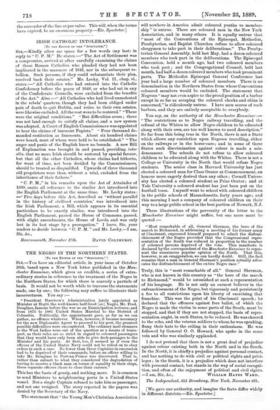IRISH CATHOLIC INTOLERANCE.
pro THE EDITOR OF THE "SPECTATOR.") SIR,—Kindly allow me space for a few words (my last) in reply to " C. P. M." He states :—" The Act of Settlement was a compromise, arrived at after carefully examining the claims of those Roman Catholics who pleaded they had not been implicated in the massacre of 1641, nor in the subsequent re- bellion. Such persons, if they could substantiate their plea, received back their estates." Mr. Lecky, Vol. IL, chap. vi., states :—" All Catholics who had entered into the Catholic Confederacy before the peace of 1648, or who had sat in any of the Confederate Councils, were excluded from the benefits of the Act." Also :—" All Catholics who had lived unmolested in the rebels' quarters, though they had been obliged under pain of death to quit Dublin, and retire to their own estates, were like wise excluded. All the rest were to be restored." " These were the original conditions." " But difficulties arose ; there was not land enough to satisfy all claims, and a new system was adopted. A Court of English Commissioners was appointed to hear the claims of innocent Papists." Four thousand de- manded restitution as Innocents. About six hundred claims were heard, most of whom were held to be established." " The anger and panic of the English knew no bounds. A new Bill of Explanation was brought in and passed, providing, inter cilia, that no more Irish should be restored by special favour, but that all the other Catholics, whose claims had hitherto, for want of time, not been decided by the Commissioners, should be treated as disqualified. Upwards of three thousand old proprietors were thus, without a trial, excluded from the inheritance of their fathers."
"C. P. M.," in his remarks upon the Act of Attainder of 1689, omits all reference to the similar Act introduced into the English Parliament at the same time. Mr. Lecky states : —" Five days before this Act, described as without parallel in the history of civilised countries,' was introduced into the Irish Parliament, a Bill, which appears in its essential particulars to be exactly similar, was introduced into the English Parliament, passed the House of Commons, passed, with slight amendments, the House of Lords, and was only lost in its last stage by a prorogation." I leave, Sir, your readers to decide between " C. P. M. " and Mr. Lecky.—I am, Sir, &e.,
Bournemouth, November 17th. DAVID COLTHIIRST.






































 Previous page
Previous page